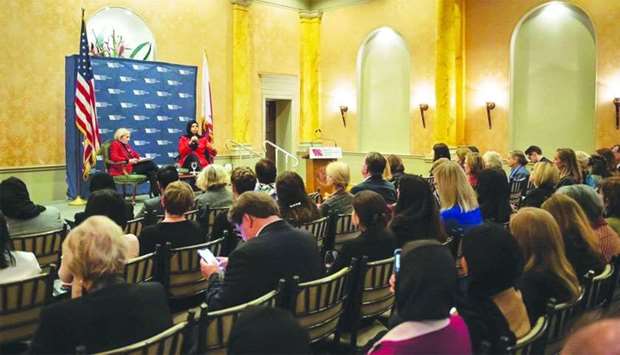About 67% of Qatar's higher education graduates are women, said HE the Spokesperson of the Ministry of Foreign Affairs Lolwah Alkhater.
This came during the participation of HE the Spokesperson of the Ministry of Foreign Affairs, in a meeting of the Women's Group for Foreign Policy in the United States.
Asked about women's rights in Qatar, she said: "Qatar is fine when it comes to women's rights. We look forward to seeing more women leaders. About 67% of Qatar's higher education graduates are women, 52% of women work in Qatar, we are more than men in the educational fields", she added.
On other issues, HE the Spokesperson of the Ministry of Foreign Affairs reiterated Qatar's support for the two-state solution on the 1967 borders and the right of return, and that East Jerusalem be the capital of Palestine in line with all UN resolutions and said : "The international community has agreed to these basic issues and, most importantly, to have them implemented."
In response to a question about the so-called "deal of the century", HE Lolwah AlKhater. said that any solution put forward by any party must comply with international law and UN resolutions, noting that the position of Qatar in this regard is no different from that of the UK, Germany or the European Union or most countries.
On Yemen, she said that Qatar was part of the Arab alliance in Yemen at the beginning, on the grounds that it would be a limited operation for three weeks. "Unfortunately, the situation is catastrophic in Yemen after four years, and the humanitarian crisis outweighs anyone's understanding. "
HE Alkhater considered violent extremism a phenomenon and that its root causes and factors that cause it must be addressed. She stressed that the solution must be comprehensive, noting that the Syrian situation requires transitional justice.
"As long as Bashar is permitted to commit his heinous crimes against his people, deterioration would continue in Syria".
She stressed the importance of a plan to resolve the Syrian crisis. "Rewarding the regime by restoring relations is certainly not a solution, and this has unfortunately begun," she said, stressing the need to reflect on the issue and its long-term implications and that one of the most important problems that the international community has to deal with is the problem of the families of the fighters in "Daesh", who were estimated in thousands.
"Those are subject to many risks, including human trafficking and the re-exploitation of terrorist acts, in addition to the problems of poverty, lack of resources and their inability to obtain an education that can rehabilitate them as good citizens in their countries," she said, stressing that Qatar is ready to be part of this comprehensive solution.
On the Gulf crisis, HE Lolwah Alkhater said: "When the blockade began, many in the world thought that this was just another tribal conflict in the Arabian Peninsula, but soon they discovered that those who started the blockade of Qatar were the same cause of instability in the Arabian Peninsula".
She regretted the absence of prospects for resolving the Gulf crisis and said: "The chances are slim because our neighbours are not responding to calls from outside forces urging dialogue," she said, referring to the call by many US officials for all sides to return to the negotiating table. "We are still open to dialogue," she added.
On Qatar's relationship with Iran, the official spokesperson of the Ministry of Foreign Affairs said Iran is the only corridor to Qatar after the closure of all land and air borders with Qatar, where 90% of the food and medicine came through.
On Qatar World Cup 2022, she said Qatar welcomes visit by Amnesty International and Human Rights Watch, and other human rights groups to Qatar "to be provided with honest and transparent comments to take advantage of them including reform and improvement, noting that much had already been done".
"Qatar knows that expatriate workers represent the most vulnerable part of society," she said, adding that "the state has changed its policies and responded to the needs of expatriate workers because these people are ultimately helping us build our country," she said, stressing the importance of honoring and appreciating migrant workers and seeking to do more to improve their situation and accept the criticism with an open mind.
On freedom of expression in Qatar, she urged everyone to visit any of the universities in Doha to listen to the discussions taking place, including discussions on governance and whether the Gulf should be a monarchical or democratic system of government. "These are the types of discussions that we conduct in our universities freely, and that is the difference between us and many of our neighbours who prefer to silence the different views of their opinion. "
On the economic reforms in Qatar, she said said that Qatar had diversified sources of supply after the blockade and receives a lot of food supplies from countries such as Azerbaijan, Turkey, Australia and Africa. "We do not rely on one country, this the policy now", she added

